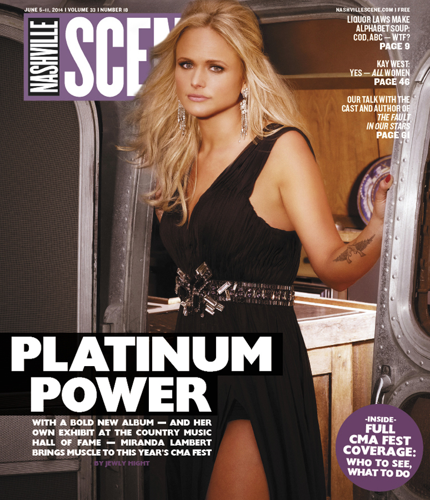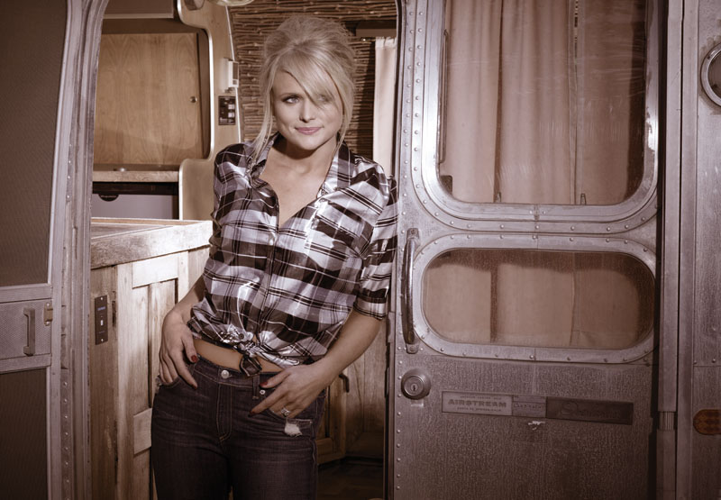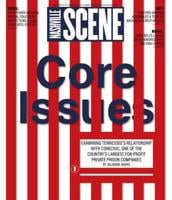
It's not for nothing that the new Miranda Lambert exhibit at the Country Music Hall of Fame and Museum — strategically timed to open just ahead of the release date for her new album Platinum and her scheduled appearance at this weekend's CMA Music Fest — is the only one in the place narrated by its own subject's tweets.
Lambert's never been inclined to let others do the talking for her. After combing through the past year or so of her Twitter feed, museum curator Kayla Wiechmann selected the exclamatory communiqués about Lambert wrapping her Locked and Reloaded Tour, going gold with her Pistol Annies trio, opening her Pink Pistol boutique in her Texas hometown and other newsy tidbits that are now arrayed alongside Lambert's costumes, microphone stands and trophies. Pretty anodyne stuff, really, but a necessary part of maintaining 21st century social media visibility and keeping a sizable audience engaged.
Yet Lambert's also never hesitated to use her allotted 140 characters to get personal in public. She's taken Eric Church to task over an insulting quote he gave in an interview, bantered affectionately with her husband Blake Shelton about tabloid rumors of trouble in their marriage, and voiced her disgust at how the multiple performance slots given to Chris Brown on the 2012 Grammy Awards seemed to sweep his assault of Rihanna under the rug. Lambert had already said her piece on domestic abuse in the revenge anthem "Gunpowder & Lead," and she thought he needed the message.
The result was a tweet heard round the media world. It escalated to celebrity-feud headlines once she waved a neon-green poster on which a fan had scrawled "Take Notes Chris Brown" in cheery bubble letters.
"I don't take it back," says Lambert, curled up on a loveseat in her label's Music Row offices. "And I don't regret it. When it happens again, [and] with whoever it happens [with], I will still take up for that person that needs to be taken up for. I will speak my mind about it.
"I don't want to be standing on a [soapbox]. I'm a singer-songwriter. I'm a country music artist. And I do get irritated when artists of any kind take that and use it as a platform to start preachin'. But at some point, when the music industry starts to celebrate something like that, I have to go, 'Wait a minute!'
"Anyway, we've moved on from it," she finishes. "And I'm sure I'll get myself in trouble another way in the next couple of years."
A country superstar should know better than to stir up controversy. That's why God and music-biz wranglers invented media training. Lambert's excuse?
"I never had media training, clearly," she says, cracking a mischievous smile. "We should just plant a camera and watch a new artist go through media training, and see what it's all about."
In the decade since Lambert debuted with her breakout album Kerosene, the momentum in mainstream country has swung decisively toward good-time songs aimed at everyone below the age of 40 — the broader the better. The "Hey Girl" template has been especially popular, replaying generic male advances on generically hot females, a pretty constricting scenario for all involved.
While Lambert may or may not have intended "Girls," the opening track of her new album, as a corrective, it sure does flip the script. But there's a lot more than that to love about Platinum. It's ambitious without being pretentious. It has the groundedness of tradition-savvy country, the magnetism of crowd-pleasing pop, the thrillingly overblown bluster of arena rock, and the engrossing eccentricities of the indie album, among them vivid detours into Western swing, (cow)pop-punk and circusy waltzing. Her longtime producer Frank Liddell notes, "There are crazy things like notes out of tune, noises. Whatever it is, it doesn't even phase her."
While promoting it, Lambert's made the boilerplate statement, "There's something there for everyone." In her case, it's true, and yet her range doesn't dilute her musical personality — something that's endeared her to mainstream country fans and previously country-averse rock critics alike.
For the better part of these 16 tracks, Lambert is a fantastically expressive entertainer, and vinegary as hell. Most significantly, now that she's out of her 20s and sharing a high-powered spotlight with her televised husband, she's using her vantage point to speak directly to a segment of the country audience that's lately been seen more than heard: grown-ass women. And if all that doesn't sound like any big deal, consider that celebrity remains a very tricky topic for country performers to address without alienating fans who want their stars down-to-earth. Not to mention that the country charts have been stuck on nostalgic exaltations of young love and adolescent lust, whereas she included only one song with those sentiments.
"This album is exactly where I am right now, at 30 years old — careerwise, personally, everything," says Lambert. "And that's how I am in life. Whatever is going on in my head is on my face and out of my mouth."
Take her new song "Bathroom Sink." Concealing gross feelings of inadequacy behind cosmetic perfection may not be groundbreaking subject matter, but the way she chews up and spits out lines like, "It's amazing / the amount of rejection / that I see in my reflection / and I can't get out of the way," pulverizes cliché. The viscerally confessional rocker made the album, in part, because of "Pretty Hurts," Beyoncé's grand statement on the excruciating side of beauty.
"I'm like, 'OK, if Beyoncé can say that, in the video and everything, then what am I scared of?' " Lambert says.
Lambert goes so far as to get graphic about bodily aging — sagging, ballooning and all — in her vaudevillian number "Gravity Is a Bitch," a brazen move for a female star who's constantly out there for the scrutinizing. It's especially bold considering how many recent country singles posit firm young asses and long legs as the chief sources of female sex appeal. She's aware that this probably isn't a song Beyoncé would sing.
"I don't think anything of hers goes awry, though," Lambert says with a laugh. "We will never see it. You'll see all my bad shit. I'm just gonna lay it out there."
Looking back over the cover art of her five albums, you can see that her self-presentation has evolved. She started out in shabby-chic tops and jeans and only gradually ventured into posh, body-hugging attire. Since there are no cameras around for our interview, she's in torn denim and a sleeveless vintage Waylon T-shirt with a scarf tied around her head. But it's been years since that was her "look." "It wasn't because I was trying to be a tomboy or anything," Lambert says of those no-frills days. "I felt like people weren't gonna listen to me or take me seriously if I was walking around in a dress. 'You need to hear me, not see me,' was my whole point. I came out of it, you know? But I still feel that way a little bit."
Which is why she likes to dress down with tough-looking accessories even as she dresses up. She leans forward and offers the crossed pistols and wings logo inked on her forearm as a permanent example. "I don't feel good in, like, everything being perfect," she says. "I always feel like I need one rough element somewhere, because I have rough edges too. So if I wear a couture gown, I sure would love to have a stud on my shoe or somethin'. I'd feel better about that. And my stylist would probably say the same thing, because she always brings that little rock 'n' roll edge, or cowgirl [edge], or whatever it is."
For the cover of Platinum, stylist Tiffany Gifford had Lambert coming down the steps of a vintage RV in a black couture gown and silver stiletto cowgirl boots, all currently on display at the Country Music Hall of Fame.
"It's very representative of what Miranda's life is — she would rather be in her Airstream and chilling with friends, or out on her farm in Oklahoma with her animals," Gifford says. "And she gets to have that part of her life. But also a part of her life, because she is this big star, is having to get dolled-up and go on red carpets and promote her music.
"To me, it's like a totally unexpected thing for somebody to be walking out of an Airstream in an evening gown. And then, of course, an evening gown with cowgirl boots — but not just any cowgirl boots. I mean, they're from her own line."
It could be, too, that Lambert feels a tension between couture and country's class consciousness. She paints a picture of "the American dream on a shoestring"during "Babies Making Babies."And her shoe line "Miranda" is carried at DSW, whose "W" stands for "warehouse." So she's no elitist in her branding. She has, however, been sporting some seriously splashy shoes in public. While assisting vice president of museum services Carolyn Tate in giving a behind-the-glass preview of the artifacts in Lambert's exhibit, curator Wiechmann whips out a ruler and places it next to the precarious spikes supporting a pair of boots. She declares the heels to be 5-and-a-half inches tall.
Those sorts of heels actually receive a couple of mentions on Lambert's new album — in the title track, with its cheeky boasts of getting gussied up to get what she wants, and "Two Rings," with its taunting refusal to put any effort into looking good for a cheating cad. She's dealing with the glamorization of her image by calling it what it is: useful artifice.
" 'Platinum' is sarcastic and fun," says Lambert. "But you have to walk the fine line of looking the part, but also not letting it be everything. That's what I've tried to struggle with all through my 20s: 'What size am I supposed to be? What am I supposed to look like?' Finally I was just like, 'Well, here it is. This is it. Like it or don't. Put Spanx on it and put some lipstick on it and go.
"Yeah, blondes with big boobs do get farther in certain situations," she throws in for good measure. "And that's all right too!"
When I suggest that there's power in knowing how things work, and in making them work for you, she's exuberant in her agreement: "That is so well said! Oh my God. I really wanna write that down and keep it forever." We pause the interview momentarily while she types a memo on her phone.
Lambert's straight shooting about the currency of desirability certainly has the potential to empower female fans her age, regardless of whether or not she'd want to call it feminism. But the impact of her commitment to candor has never been limited to listeners who look exactly like her. Three years into the trend of terrestrial country radio sidelining female voices, it does everybody good to see Lambert putting her money where her mouth is where gender solidarity's concerned. Besides sporadically joining with fellow Pistol Annies Ashley Monroe and Angaleena Presley to cook up songs rife with audacious down-home realism, she makes a habit of writing with some of Music Row's sharpest female songsmiths, like Natalie Hemby and Nicole Galyon.
"I just feel like if we're not champions of each other, then who's gonna be?" Lambert says. "We have to. It's our duty to lift each other up and to support each other."
Then there's her vaguely Thelma & Louise-inspired arena-rocking duet with Carrie Underwood, "Somethin' Bad," during which the two of them trade vocal swagger and bombast for a full three minutes. The performance they gave on the Billboard Awards received decidedly mixed reviews — even on Lambert's online fan forum, where there were rumblings of an aesthetic mismatch and even a Ran Fan-CU Fan rivalry.
But the song ought to be heard for the outrageous, knowing bit of theater it is. One commenter on Lambert's site pointed out incredulously, "People seem to embrace the 'bro country' and now we have some 'sistah country' and everyone hates it?"
Of Underwood, Lambert says, "I've always respected her. We're way different stylistically. And we're different people. But there's two female country artists collaborating — that doesn't happen very often. And it needs to."
Lambert's gone on record about how much harder women have to work to get anywhere in country at the moment. Despite her past successes — and the fact that she's the reigning CMA and ACM Female Vocalist of the Year — it's not like hit singles are a given. (Beneath the nostalgic veneer of her current single "Automatic," you can almost hear her alluding to all the effort she expends.) Aside from a sparkling Keith Urban pop-country track she sang on, "We Were Us," she hasn't had a No. 1 since May 2012.
Urban wasn't the only male artist whose track Lambert lent her voice to last year. All three Annies were cast as hillbilly sirens in Shelton's hick-hop chart-topper "Boys 'Round Here" (her exhibit features the bustier-and-bullet-belt combo she wore in the video). In addition, Lambert served as duet partner to Justin Moore on the exemplary heartache ballad "Old Habits."
But you'd expect Lambert to have an investment in Shelton's career. Her readiness to also team with Urban, on the pop-smart end of country's stylistic spectrum, and Moore, who's as dedicated in his hardcore Hank Jr.-influenced bearing as any contemporary act, says a lot about where she's coming from — namely, that she's uninterested in being corralled into any sort of "women's country" niche.
Even though Esquire once dubbed her Most Terrifying Woman of the Year (based on her rep for anger-fueled, armed-and-dangerous singles), she's always done well with all manner of male fans, from those who live the imperiled rural existence reflected in many a country song to those who may have read her No Depression cover story in considerably more cosmopolitan digs. She's developed an aptitude for shooting from the hip and genuinely saying something. Though she'll later insist during brief remarks at her exhibit's VIP opening ceremony that she "never say[s] anything that smart," that's poor-mouthing. Throughout our interview, she's undeniably keen and quick; it's just that intellectualizing isn't her style.
"She just looks it right in the eye, and she writes it," says producer Liddell of her songs. "She doesn't think about, 'OK, how is this gonna work? What am I trying to say? What do my fans want?' She just rolls with it, like nobody I've ever seen."
Even if she can't be all things to all listeners, Lambert's unapologetic insistence on speaking her mind, damn the PR consequences, supplies a lot of listeners with a quality they find compelling — irreducible humanity. Or to put it another way, the sense that there's an uninhibited, individual point of view animating the Big Show. That comes through in songs she pens solo, like "Bathroom Sink"; songs she co-writes, like "Gravity Is a Bitch"; and songs she gets from Row writers and commercial outsiders alike — such as "Priscilla," an open letter to the former Ms. Elvis Presley seeking advice on being married to a wildly in-demand man. "All That's Left," a lighthearted little "Let's get on with this divorce" tune, is a song Tom T. Hall wrote with his wife Dixie Hall, long after leaving the mainstream spotlight for trad bluegrass.
"All Kinds of Kinds," the fifth and final single released from Lambert's previous album Four the Record, is another example of her ear for self-expression in other people's work. After veteran songsmiths Don Henry and Phillip Coleman wrote the song, it sat around uncut for years. That's not at all uncommon in Nashville — but in this case, the fact that the lyrics describe a congressman who gets off on cross-dressing (and a slew of other nontraditional identities) as worthy of acceptance may have made it a harder sell. Lambert put it out on her album well over a year before Kacey Musgraves' debut included the breezy tolerance anthem "Follow Your Arrow."
While none of the folks featured in Lambert's video for "All Kinds of Kinds" seem to represent nontraditional gender performance, at least not in any obvious way, she encountered a fan in the flesh who told her he identifies with the "Thomas/Thomasina" character in the song. Now, anyone with sufficient funds for a ticket can go to any concert they please, so long as they're of age (or have the ID to fake it). But when you seldom hear yourself portrayed in song, it makes a world of difference to hear a performer extend a welcome out loud.
" 'All Kinds of Kinds' is the glue of the whole night," Lambert says. "This is why we're here, all of us together — because we love country music, me included, my band included. No matter what kind of differences we all have — political views, everything that could possibly be different about all of us — we're here because of one reason, and it's music. So let's join hands and sing 'Kumbaya.' "
Email editor@nashvillescene.com.






